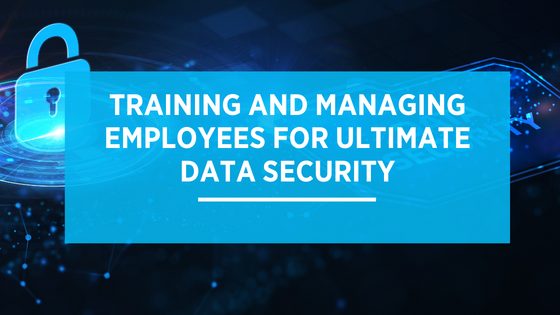Training and Managing Employees for Ultimate Data Security

It’s important that every accounting firm and tax professional establish basic employee training and management protocols to protect sensitive business and tax client information. Training and managing employees for ultimate data security is an important aspect of complying with the FTC Safeguards Rule.
A few months ago, we guided you through the general requirements of the FTC Safeguards rule. In this post, we’ll provide you with basic employee training and management tips you can use to protect your accounting business and client information from unauthorized access or disclosure.
Keep reading to learn the essential employee training and management protocols you can establish to ensure you comply with the FTC rules.
Managing Employees
Creating a protocol for new employees is an important step in securing sensitive business and client information. As an accounting firm, you handle and store a large amount of sensitive data, including tax information, customer financial records, and company financial records.
To ensure ultimate data security when hiring new employees, consider the following:
Conduct Thorough Background Checks
Checking references is a common practice among most large companies. Still, busy business owners can get caught up in daily operations, and it’s hard to conduct a thorough vetting process.
Before hiring employees for your tax or accounting firm, ensure you are doing your due diligence. Contact listed references and do a background check on employees who will have access to sensitive customer information.
While not every member of your team will have access to sensitive files, it may be wise to run a background check for every employee before hiring.
Draw Up Confidentiality Agreements
Another security measure you may consider adopting for new hires is confidentiality agreements. While this may cost you money upfront in the form of legal fees, having new hires sign a confidentiality agreement prior to their hire can make a significant difference to your security.
Within the confidentiality agreement, you may ask your lawyer to include the basic security standards your company adheres to when handling client information.
Business Need-to-Know
Limiting client information to only those employees in charge of the account is an important step in complying with the FTC Safeguards rule. By protecting client information in this way, you are limiting potential security breaches.
While it’s unlikely that an internal member of your team will leak sensitive information knowingly, there are still many security risks associated with normal operations. Limiting access ensures your accounting firm is doing everything it can to mitigate the risk of a cybersecurity attack.
Employee Training
Training employees for ultimate data security is not only a critical aspect of IRS compliance, but it should also be an important aspect of managing your accounting firm.
Here are some employee training steps you can take to ensure ultimate data security and FTC compliance:
Establish Clear Policies and Procedures
It’s important to have clear policies and procedures in place that outline how employees should handle sensitive data, as well as what is expected of them in terms of data security.
Policies and procedures should include guidelines for password protection, handling confidential documents, and accessing sensitive data. You may also want to create separate policies and training on the use of laptops, desktops, and company-issued cell phones.
Implement Strong Password Policies
Passwords should be long and complex, and all employees should be required to change them on a regular basis. Creating these habits can take time, but if you have an expert IT management team on your side, staying on top of passwords and security management is easy.
Contact us to get started.
Secure Physical Documents
Sensitive documents, such as tax returns and financial records, should be kept in a secure location, such as a locked cabinet or safe. You should train employees on the proper handling and disposal of physical documents to prevent unauthorized access.
This is where establishing clear policies and procedures comes in. If your employees have clear guidelines on how to handle physical documents, they are more likely to create good security habits.
Use Encrypted Communication
Email and other forms of electronic communication should be encrypted to protect against unauthorized access. This includes both internal communication within the company and communication with external parties, such as customers or clients.
There is business-grade encryption software that ABL Computers can help you install to ensure your communication is encrypted and secured. Reach out to us today if you don’t have encryption software installed.
Disciplinary Measures and Ongoing Training
Preventing unauthorized access to data is an ongoing job. It’s imperative that your accounting firm hold ongoing training throughout the year to ensure your team knows how to handle sensitive data.
Included in the ongoing training should be clear outlines of disciplinary measures for the breach of sensitive client or company information. While it’s a difficult conversation to have with your team, it’s important they understand the legal requirement to secure sensitive information.
Overall, ensuring FTC Safeguards Rule compliance and ultimate data security requires a combination of strong policies, ongoing employee training, and robust security measures. By implementing these steps, your accounting firm can protect sensitive data and ensure compliance with all relevant laws and regulations.
If you’re unsure where to start in complying with the FTC Safeguards Rule, contact us now. We’ll help you set up security measures and policies to help your team keep data safe.

